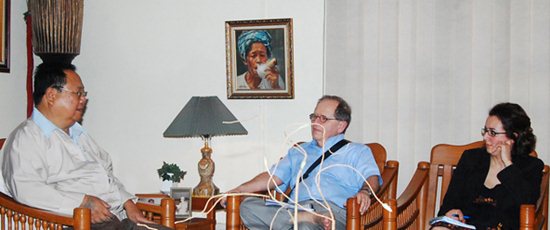There can be no strong union if the constituent states are weak, the recently released political prisoner and leader of the de-registered Shan Nationalities League for Democracy (SNLD) Hkun Htun Oo told a visiting Canadian organization last Sunday, 26 February.

“The Union government still call the shots in managing natural resources,” he told the Rights and Democracy (RD)’s president Gerard Latulippe, citing Kayah State’s Lawpita hydro power project that has been supplying electricity to lower Burma since the 1950’s, as well as the Shwe gas pipelines in construction coming from Arakan / Rakhine state. “At least the states concerned should benefit from these projects. There has been no clear provisions in the constitution about which (state or union) should manage the natural resources.”
Reminiscing about his 7 year ordeal in prison (“It’s like a fairy tale to me”), he denied all the charges leveled against him, including one that said he was part of the exiled Shan government set up two months after he was arrested in 2005. “The years in jail have made me more determined than ever to work for the people who had trusted me and elected me (in the 1990 general elections),” he added.
He also took the opportunity to take a swipe at the present regime. “They say druglords and rebels are controlling the border areas,” he said. “But I seem to be seeing 8-9 druglords sitting in the parliament.”
Shan Drug Watch 2011 report has charged that at least 7 of the Members of Parliament are known drug entrepreneurs.
Hkun Htun Oo, 69, is a scion of the Hsipaw Princely House, whose last ruling prince Sao Kya Seng (his uncle) was detained during the 1962 coup never to return to his home and family. A founder of the SNLD in 1988, he was elected by the people in his hometown two years later. His party also won statewide, but like the NLD that had won countrywide, the ruling military council had refused to transfer power.
Hkun Htun Oo aka Khun Tun Oo has been known as an outspoken politician. His bold presentations in the 1993 National Convention, called by the junta to lay down principles for the constitution, had won grudging admiration even from the Burman parties that had previously regarded him only as a leader of minorities who rarely looks beyond their narrow interests.


